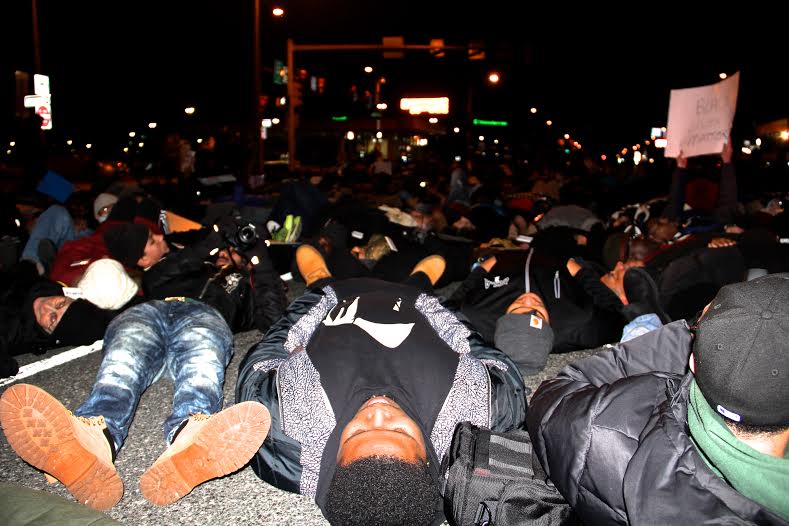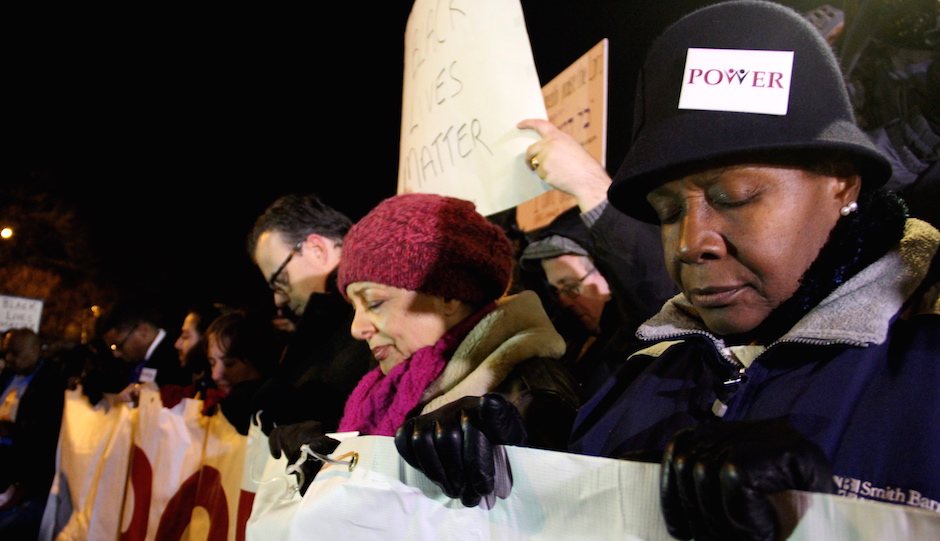Just Who’s Responsible for These Die-Ins?

POWER members “die-in” after the Eagles game last Sunday. Photo courtesy of POWER.
Gosh, those folks from POWER are a huge pain in Philadelphia’s butt.
You may not know the organization, but you probably know its handiwork in recent weeks. They started off by backing airport workers in a one-day strike for higher wages. They then threatened to disrupt a state education committee meeting being held in Philadelphia. And then, last weekend, the worst outrage of all: They staged a “die-in” at Broad and Pattison at the end of the Eagles game, slowing traffic and infuriating passersby.
Like I said: A huge pain in the butt. But get this — the folks at POWER are OK with that appraisal. In fact, they say the pain is the whole point.
After all, says Bishop Dwayne Royster, the group’s executive director, Philadelphia’s minorities face injustice and racism every day in jobs, education and policing. Why should they be the only ones to bear that burden?
“Certainly, if we’re going to feel this pain,” he says in an interview last week, “then others are going to feel it with us, until we’re in a dialogue about the discrimination we face in this country.”
Yeah, well, maybe POWER likes causing trouble. But if they’re so busy alienating people, how can they possibly persuade them on the issues? Royster, you might not be surprised to learn, is unconcerned with such questions.
“The people who were calling us ‘assholes’ and ‘niggers’ when we were lying at Broad and Pattison will never join us,” he says. “We’re OK with that.”

Bishop Dwayne Royster, POWER’s executive director.
•
PHILADELPHIA HAS NEVER lacked for civic activists willing to drop everything to chant and carry protest signs around City Hall. But — spurred in large part by the national outrage over Michael Brown’s death in Ferguson and Eric Garner’s death in New York — the city appears to be experiencing an especially energetic moment of activism.
POWER is a relatively recent addition to the scene — and certainly, it hasn’t been the only group out on the streets in recent week, but it has been one of the more prominent. It started in 2010 as a coalition of more than 40 congregations ranging across a variety of faiths, with a mission to fix the “broken systems” that afflict the city’s people of color.
“We’ve had enough of poor people being oppressed by wages on which no one can support a family while those at the top make off like bandits,” the Rev. Ernest Flores wrote at the group’s blog recently. “We’ve had enough of our schools failing to educate our children, pushing them out of the way of academic success and into the teeth of the prison industrial complex. We’ve had enough of Black men and women’s rights and even lives being trampled into the dust of the earth by racial profiling — and know that this is not just a problem of the police but of whole systems that undervalue their lives.”
While POWER has a wide range of concerns, they’ve tackled policing issues raised by events in Ferguson and New York, saying that while Philadelphia leaders like Commissioner Charles Ramsey often show concern about the rights of citizens (and protesters) there are still problems.
“Ferguson is Philadelphia,” Royster says. “Philadelphia is New York and New York is Philadelphia. The things that have happened in those places have happened here.”
“There are always systemic issues that continue to come up,” adds the Rev. Cean James, who helped POWER draft a “list of demands” (below) about policing practices that was unveiled following a Wednesday rally featuring Sonia Sanchez.
The demands (see the list below) ranged from the global — “demilitarization” of police departments — to the specific, like the request for an independent Police Review Board of the type proposed by Councilman Curtis Jones Jr. and endorsed by the Committee of Seventy.
“What we’re really fighting here are systems,” Royster says. “This is all policy work.”

POWER during a recent “die-in” protest against police abuses. Photo courtesy of POWER.
•
“POLICY WORK,” THOUGH, sounds a bit more anodyne than the messy, provocative work of lying down in the middle of the street and causing a traffic jam to make your point. If commenters at Philly Mag and on the magazine’s Facebook page are any indication, last Sunday’s “die-in” at the Eagles game might have created more anger about a nonviolent protest than any similar event in recent Philadelphia history.
Which doesn’t bother POWER’s leaders at all.
“People who feel they don’t have a voice sometimes have to go to different measures to be heard,” James says.
They’ve certainly heard all the arguments you’ve heard or want to make. Why protest shootings by police? After all, most African Americans are murdered by other African Americans, right? Why not focus on black-on-black violence instead?
Royster can barely keep the sarcasm out of his voice. “There’s white-on-white violence. How come nobody’s protesting white-on-white violence?” he asks, correctly noting that most white Americans are killed by other white Americans. “When people start fighting white-on-white crime, we’ll have that conversation.”
They’re also not worried that their brand of non-violent disruption will end up alienating potential allies or end up being counterproductive.
“I think history would say differently,” says James, alluding to the civil rights movement of previous generations.
“For people who understand what we’re doing, they’ll find courage to join us,” Royster adds. “People who don’t have a voice, people will find courage as we grow bigger.”
Well then, isn’t it at least tiring to be angry all the time? Royster offers a reminder that, at its foundation, POWER is a faith-based group.
“There’s a rage that’s always beneath the surface but there’s always hope, too,” Royster says.
Activist groups tend to have a limited life cycle before they grow stale and calcified. POWER is having a moment, Royster acknowledges, where the issues it cares about just happen to be on center stage. But he hopes the organization has staying power. The problems it is trying to fix certainly do.
“We’re people who believe Philadelphia and America haven’t lived up to what they can be,” he says. “Ultimately, what we’re fightng for is the survival of people in our communities, so they can live decent lives.”
If that fight makes some people uncomfortable sometimes, so be it.
Follow @JoelMMathis on Twitter.


